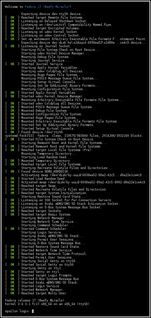
The Apache HTTP Server, colloquially called Apache, is a free and open-source cross-platform web server software, released under the terms of Apache License 2.0. Apache is developed and maintained by an open community of developers under the auspices of the Apache Software Foundation.

Free software is computer software distributed under terms that allow users to run the software for any purpose as well as to study, change, and distribute it and any adapted versions. Free software is a matter of liberty, not price; all users are legally free to do what they want with their copies of a free software regardless of how much is paid to obtain the program. Computer programs are deemed "free" if they give end-users ultimate control over the software and, subsequently, over their devices.

GNU Hurd is the multiserver microkernel written as part of GNU. It has been under development since 1990 by the GNU Project of the Free Software Foundation, designed as a replacement for the Unix kernel, and released as free software under the GNU General Public License. When the Linux kernel proved to be a viable solution, development of GNU Hurd slowed, at times alternating between stasis and renewed activity and interest.
dpkg is the software at the base of the package management system in the free operating system Debian and its numerous derivatives. dpkg is used to install, remove, and provide information about .deb packages.
PF is a BSD licensed stateful packet filter, a central piece of software for firewalling. It is comparable to netfilter (iptables), ipfw, and ipfilter.
A chroot on Unix operating systems is an operation that changes the apparent root directory for the current running process and its children. A program that is run in such a modified environment cannot name files outside the designated directory tree. The term "chroot" may refer to the chroot(2) system call or the chroot(8) wrapper program. The modified environment is called a chroot jail.
TCP Wrappers is a host-based networking ACL system, used to filter network access to Internet Protocol servers on (Unix-like) operating systems such as Linux or BSD. It allows host or subnetwork IP addresses, names and/or ident query replies, to be used as tokens on which to filter for access control purposes.
Domain Technologie Control (DTC) is a web hosting control panel aimed at providing a graphics-oriented layout for managing commercial hosting of web servers, intended for shared web hosting servers, virtual private servers (VPSes), and dedicated servers. Domain Technologie Control is free software released under the GNU LGPL v2.1 license. It is fully skinnable and translated into several languages.
A dedicated hosting service, dedicated server, or managed hosting service is a type of Internet hosting in which the client leases an entire server not shared with anyone else. This is more flexible than shared hosting, as organizations have full control over the server(s), including choice of operating system, hardware, etc.
Pure-FTPd is a free FTP Server with a strong focus on software security. It can be compiled and run on a variety of Unix-like computer operating systems including Linux, OpenBSD, NetBSD, FreeBSD, DragonFly BSD, Solaris, Tru64, Darwin, Irix and HP-UX. It has also been ported to Android.
vsftpd,, is an FTP server for Unix-like systems, including Linux. It is the default FTP server in the Ubuntu, CentOS, Fedora, NimbleX, Slackware and RHEL Linux distributions. It is licensed under the GNU General Public License. It supports IPv6, TLS and FTPS.

PulseAudio is a network-capable sound server program distributed via the freedesktop.org project. It runs mainly on Linux, various BSD distributions such as FreeBSD and OpenBSD, macOS, as well as Illumos distributions and the Solaris operating system.
HAL is a software subsystem for UNIX-like operating systems providing hardware abstraction.

FreeBSD is a free and open-source Unix-like operating system descended from the Berkeley Software Distribution (BSD), which was based on Research Unix. The first version of FreeBSD was released in 1993. In 2005, FreeBSD was the most popular open-source BSD operating system, accounting for more than three-quarters of all installed simply, permissively licensed BSD systems.
glFTPd is a freely available FTP server which runs on Unix, Linux, and BSD operating systems. It has number of features, like logins restricted by a particular set of IP addresses, transfer quotas per-user and per-group basis, and user/groups not stored in the system files, which make it attractive to private warez servers, including topsites. It does have legitimate uses though—a number of web development books recommend it amongst other general purpose FTP servers, and some Linux certification exams of SAIR required knowledge of it. It can integrate with Eggdrop through IRC channels.
Przemysław Frasunek is a "white hat" hacker from Poland. He has been a frequent Bugtraq poster since late in the 1990s, noted for one of the first published successful software exploits for the format string bug class of attacks, just after the first exploit of the person using nickname tf8. Until that time the vulnerability was thought harmless.
War FTP Daemon is a free FTP server for Windows, written by Jarle ("jgaa") Aase. When it was first released in 1996, it was the first free FTP server on this software platform. Warftpd has received many awards over the years, and is still popular, even though core features have remained unchanged since the release of the 1.8 beta in 2000. Warftpd has been packed with features since the start, and it has been considered very secure. As of at least 2013, security related issues are still being fixed in the older, Warftpd 1.8x releases.

OpenSSH is a suite of secure networking utilities based on the Secure Shell (SSH) protocol, which provides a secure channel over an unsecured network in a client–server architecture.

systemd is a software suite that provides an array of system components for Linux operating systems. Its main aim is to unify service configuration and behavior across Linux distributions; systemd's primary component is a "system and service manager"—an init system used to bootstrap user space and manage user processes. It also provides replacements for various daemons and utilities, including device management, login management, network connection management, and event logging. The name systemd adheres to the Unix convention of naming daemons by appending the letter d. It also plays on the term "System D", which refers to a person's ability to adapt quickly and improvise to solve problems. Since 2015, the majority of Linux distributions have adopted systemd, having replaced other systems such as the UNIX System V and BSD init systems. Systemd has faced mixed reception from Linux users, with arguments that systemd suffers from mission creep and bloat, as well as criticism over software adding dependencies on systemd—complicating compatibility with other Unix-like operating systems, and making it hard to move away from systemd. Concerns have also been raised about Red Hat and its parent company IBM controlling the scene of init systems on Linux. More importantly, the complexity of systemd results in a greatly enlarged attack surface reducing the overall security of the platform.

ProFTPD is an FTP server. ProFTPD is Free and open-source software, compatible with Unix-like systems and Microsoft Windows . Along with vsftpd and Pure-FTPd, ProFTPD is among the most popular FTP servers in Unix-like environments today. Compared to those, which focus e.g. on simplicity, speed or security, ProFTPD's primary design goal is to be a highly feature rich FTP server, exposing a large amount of configuration options to the user.







